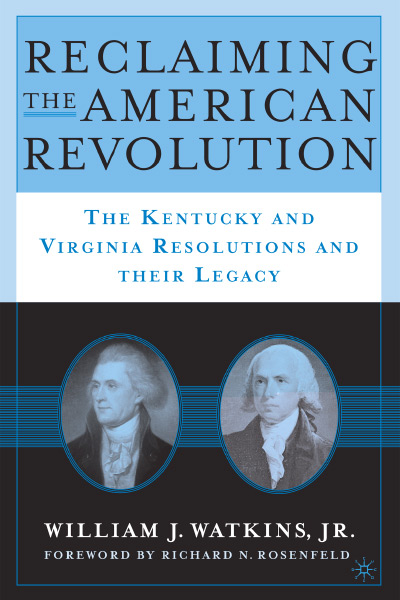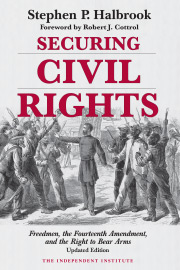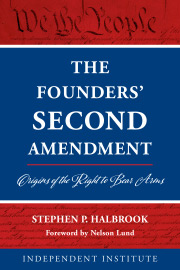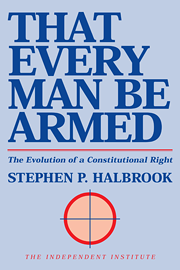| List Price: | ||
| Price: | $29.48 | |
| Discount: | $29.47 (Save 50%) |
| Formats |
Hardcover |
eBook |
| List Price: | ||
| Price: | $29.48 | |
| Discount: | $29.47 (Save 50%) |
| Formats |
Hardcover |
eBook |
Overview
The history of Anglo-American liberty is, in many respects, a history of great charters and the events leading to their adoption. Consequently, Americans revere documents such as the Declaration of Independence, the Constitution, and the Bill of Rights. However, conspicuously absent from this list of revered charters are Thomas Jefferson’s and James Madison’s Kentucky and Virginia Resolutions. Viewing the Constitution as a procedural document meant to limit government and bring it under the rule of law, the Resolves were for much of the Nineteenth Century considered as a starting point for any discussion of liberty and federal and state relations.
Unfortunately, the Resolves and the events that led to their writing have been largely forgotten today. For example, the only book-length work devoted to the Resolves is Ethelbert Dudley Warfield’s 1894 classic, The Kentucky Resolutions of 1798: An Historical Study.
William Watkins’ Reclaiming the American Revolution: The Kentucky and Virginia Resolutions and Their Legacy restores the Resolutions to their proper place in American history and constitutional law. By presenting the historical background to the resolutions and the interpretation of the resolutions through history, including numerous pressing contemporary issues, Watkins sheds light on federalism, decentralization, civil liberties, checks and balances and what the American constitutional experiment is and should be all about.
Reclaiming the American Revolution is thus a unique blend of history, constitutional law and political theory centered around the importance of the Kentucky and Virginia Resolutions as constitutional documents. Morover, the book traces the importance of the Resolves to such current controversies over federal power as the USA PATRIOT Act, medical marijuana, war powers, tax authority, etc.
Contents
- Chapter 1. Monocrats and Jacobins
- Chapter 2. Legislation and Persecution
- Chapter 3. The Principles of 1798
- Chapter 4. Influence of the Resolutions
- Chapter 5. Consolidation
- Chapter 6. Lessons for Today
- Appendices
A. Jefferson’s Draft of the Kentucky Resolution
B. Kentucky Resolution of 1798
C. Virginia Resolution of 1798
D. Kentucky Resolution of 1799
Detailed Summary
• The Kentucky and Virginia Resolutions of 1798 are among the most important documents in American history. Thomas Jefferson and James Madison wrote the Resolutions in response to the Alien and Sedition Acts, under which the federal government violated the First Amendment and exercised powers beyond those authorized by the U.S. Constitution (Article 1, Section 8). The relevance of the Resolutions continued through U.S. history to today's USA PATRIOT Act.
• The Alien and Sedition Acts were among the worst restrictions on liberty in U.S. history. The Sedition Act criminalized false or scandalous statements about the government, Congress or the President. The Secretary of State monitored all newspapers throughout the country and sent dispatches to city federal prosecutors to take action for the printing of any "seditious" material. Prosecutions were brought against newspapers in the country's largest cities-Philadelphia, Boston, Baltimore, New York, and Richmond, and the Sedition Act cast a chill on political dialogue.
• The Alien and Sedition Acts were controversial among voters. Congressman Matthew Lyon (Vermont) was indicted under the Sedition Act for criticizing the Adams administration and sentenced to four months in prison and fined $1000. Expressing their displeasure over the conviction, Lyon's constituents reelected him while he was in prison.
• Opponents of slavery used the principles of the Kentucky and Virginia Resolutions to nullify the Fugitive Slave Law. Some, such as abolitionist leader William Lloyd Garrison, even urged the North to secede rather than continue in a union with slaveholders.
• State statutes concerning the medicinal use of marijuana, which are in conflict with federal controlled substances legislation, will likely be the next battleground in the saga of state and federal relations. This, too, will show the importance Americans' understanding the doctrines of federalism and individual sovereignty articulated in the Resolutions.
• In 1798, James Madison pointed to war measures as leading to the loss of liberty at home. The same problem has resulted from the current "War on Terror." Under the PATRIOT Act, the federal government has more discretionary power than ever before to monitor the activities of ordinary Americans.
• Reminiscent of the Aliens Acts of 1798, the federal government threatens the rights of non-citizens. Even though the federal trial courts are available, secret military tribunals are slated to try suspected foreign terrorists. The federal rules of evidence will not apply to these proceedings and a death sentence may be handed down on a two-thirds vote.
• The attorney-client privilege is compromised under the PATRIOT Act. Federal correctional facilities may monitor these sensitive communications if they determine that such actions are reasonably necessary to deter future acts of terrorism. Under these circumstances, the accused and his attorney are hamstrung in putting up a defense to the government's charges.
• Though much has changed in the last 200 hundred years, federalism remains relevant for four reasons: (1) divergent local circumstances, (2) the need for experimentation and competition in policy-making, (3) the need to monitor those entrusted with power, and (4) the need to ensure that power is properly diffused.
The Kentucky and Virginia Resolutions, penned by Thomas Jefferson and James Madison, are a peerless study of First Principles, as constitutional lawyer William Watkins explains in Reclaiming the American Revolution: The Kentucky and Virginia Resolutions and their Legacy. Written more than two decades after the colonies declared independence from Great Britain, the Resolutions remain intrepid statements of self-government and limited central authority. Recognizing that power can only be checked by power, the Resolutions call for the states to interpose against unconstitutional acts of the national government.
A Check on Federal PowerThe Resolutions were responses to the Alien and Sedition Acts. Passed in the summer of 1798, the Acts were the most illiberal legislation enacted during the early national period. Ostensibly aimed at securing the home front as the Federalist Party braced for war with France, the Acts served the broader purpose of consolidating political power for the Federalists. Through this legislation, the Federalists sought to restrain democratic-minded foreigners and to silence all criticism of the national government.
Early on, Jefferson and Madison saw the Acts as an attack on civil liberties and state sovereignty. During this “reign of witches,” the national government brought lawsuits for seditious libel against leading newspapers in Philadelphia, Boston, New York, and Richmond. To Republicans, these suits presented a great danger because the right to freely examine public characters and measures has often been deemed as the guardian of every other right.
During the Sedition Act controversy, Republicans adopted a modern libertarian theory of freedom of the press. Republicans such as St. George Tucker, the preeminent legal theorist of the era, postulated that an individual has the freedom to publish his sentiments without restraint, control, or fear of punishment for doing so. Until then, most Americans adhered to the rule of “no prior restraints.” Under this doctrine, the government could not prohibit an individual from publishing but could impose severe sanctions against the individual afterward. The threat of punishment after publication served as a great deterrent to free expression.
Federalism, Sovereignty and Self-GovernmentWhile the protection of individual rights such as free speech is key to understanding the Kentucky and Virginia Resolutions, federalism and sovereignty are also important. Federalism (the division of legislative sovereignty between the national and state governments) is a cardinal principle of the Constitution, while the question of who has sovereignty (the supreme power of the citizenry) was at the heart of the American Revolution. Colonists argued that sovereignty resided in each colonial legislature. The British, on the other hand, believed that sovereignty resided in Parliament and therefore Parliament could make laws binding on all subjects of the crown.
After achieving independence, the theory of sovereignty further developed and Americans rejected the idea that an artificial body such as a legislature could possess supreme power. Rather than each state legislature possessing supreme power, Americans believed that the people of each state were the sovereign authority and had delegated to their elected representatives certain powers. Thus, we often say that the people of the several states possess ultimate sovereignty and their representatives possess governmental or legislative sovereignty.
Legislative sovereignty, as it relates to federalism, goes to the heart of self-government. To the Framers of the Constitution and the Revolutionaries before them, self-government meant much more than representation and voting rights. They understood that true self-government must be carried on in bodies close to the people. Small units of government permit the people to know their representatives and the representatives to know the facts and circumstances of the people. In these bodies the community’s voice is heard and laws are crafted to conform to the character of the citizenry.
Alien and Sedition Acts Undermined Self-GovernmentIn passing the Alien and Sedition Acts, according to Republicans, Congress greatly exceeded its delegated powers and thus infringed upon the powers remaining with the state legislatures as governmental sovereigns or the people as ultimate sovereigns. This usurpation thus threatened the right to self-government because the people had delegated, for example, no power to Congress to legislate regarding speech. In fact, the First Amendment specifically prohibits Congress from legislating on that subject.
As for the remedy, Jefferson and Madison pointed to nullification and interposition, whereby they declared the Acts void and of no force. Although neither Kentucky nor Virginia actually nullified a federal law and both took pains to emphasize that the Resolutions were protests, the legacy of the Resolutions is much more than that. Fortunately, Kentucky and Virginia were not forced to take more drastic measures because Jefferson was elected to the presidency in the Revolution of 1800, and the hated Sedition Act expired at midnight just before he took office.
The Legacy of the ResolutionsIn the early national period, the Principles of the Resolutions gained acceptance throughout the United States. During conflicts between state and national authority, reports and resolutions adopted by state legislatures, messages from state executives, opinions of state courts, and speeches of leading citizens all ring with the words of the Kentucky and Virginia Resolutions.
Against the wishes of James Madison, South Carolina in 1832 added flesh to the skeletons of nullification and interposition. South Carolina called a special convention capable of wielding sovereign power and nullified the Tariffs of 1828 and 1832. As implemented, nullification did not rely on bayonets and brigands. Eschewing force, South Carolina sought to use the state court system to carry out nullification. South Carolina’s actions, however, almost caused a war between the states as President Andrew Jackson prepared to march on South Carolina. Fortunately, a compromise was reached and war was avoided.
Lessons for TodayWhile the modern world is much different from that of the late 1700s, the march of years has in no way rendered federalism obsolete. If anything, the diversity that is modern America highlights the need for local self-governance and decentralized decision-making. The more diverse a society, the more it needs a pure federalist system. Only in a federalist system can a citizenry continue to work together toward great national objectives while we govern ourselves in the context of our myriad differences.
Unfortunately, our modern federal system is in disarray and functioning nothing like the system designed by the Framers. In the words of noted constitutional scholar Edward S. Corwin, “our system has lost its resiliency and what was once vaunted as a Constitution of Rights, both state and private, has been replaced by a Constitution of powers.”
If we are to reform our system of government, the first step must be the rediscovery of the American Revolutionary tradition and its lessons about self-government. Integral parts of this understanding are the Kentucky and Virginia Resolutions. The Resolutions articulate the basics of self- government in an eloquent, yet logical, manner; they are second only to the Constitution in the pantheon of American charters. Only if Americans embrace the Resolutions’ lessons about divided legislative sovereignty and ultimate sovereignty will a restoration of our written Constitution be possible.
Praise
“With Reclaiming the American Revolution, we have a thorough, thoughtful, and important study of a significant subject that has been too long neglected.”
—JOYCE O. APPLEBY, Professor of History, UCLA; past president of Organization of American Historians and American Historical Association
“Reclaiming the American Revolution, the first on the resolutions in a hundred years, is more a work for citizens than scholars. Half of it—eighty-two pages—is given to the background, preparation, and content of the resolutions. This half is solidly informed. . . . The other half of the book recounts the history of state interpositions or other forms of state resistance through the nullification crisis of 1832, the consolidation of authority in central hands in the years since the Civil War, and the current situation. . . . Reclaiming the American Revolution should stir some serious thinking about constitutional fundamentals, about whether a genuinely federal system is what the people still desire, and about new ways in which the federal division of authority might be maintained.”
—AMERICAN HISTORICAL REVIEW
“There is no more important neglected topic in American history and law than Jefferson’s and Madison’s constitutional commentary in the Kentucky and Virginia Resolutions of 1798-1800. With historical knowledge that one can only wish more lawyers could possess, Mr. Watkins has brought our attention back to these neglected documents and their illuminating relation to American history. Even better, the author has shown for the first time that the Kentucky and Virginia Resolutions were a natural outgrowth of the American Revolution, and that they have relevance for today's problems—if we will let them speak to us.”
—CLYDE N. WILSON, Professor of History, University of South Carolina
“Reclaiming the American Revolution is a provocative invitation to rethink the nature of contemporary American government in the light of the Kentucky and Virginia Resolutions. William Watkins’ brisk and panoramic account of the states’ rights tradition in American constitutionalism reminds us of the political possibilities open to courageous and spirited citizens who are dedicated to responsible liberty under the rule of law.”
—HERMAN BELZ, Professor of History, University of Maryland
"The delightfully passionate book, Reclaiming the American Revolution, does a truly astonishing job. This is one of the wisest books on America to appear in the new Millennium."
—STEPHEN PRESSER, Professor of Legal History, Northwestern University
“Those of us who are alarmed by the recent incursions into personal freedom that have followed in the wake of the Administration’s open-ended ‘war’ on terrorism are indebted to William Watkins for Reclaiming the American Revolution, his penetrating and insightful account of how Jefferson and Madison reacted to a situation of equal peril to American liberty. As citizens of the republic we will each be judged on how we stood against those who would eat away at our rights under the guise of protecting us from attacks on our sovereignty. We could not do better than to remind ourselves of how Jefferson and Madison responded when faced with a crisis no less grievous.”
—RONALD HAMOWY, Professor Emeritus of History, University of Alberta; editor, Cato’s Letters: Essays on Liberty by John Trenchard and Thomas Gordon
“William Watkins has prepared an absorbing account of one of the most significant chapters in the early history of the American Republic. An appreciation of the story of the Kentucky and Virginia Resolutions is simply essential to an appreciation of our Constitution and its carefully crafted division of power between the states and the federal government. Watkins’ thoughtful and well-researched work is bound to persuade cynical members of the legal community that the current effort of the United States Supreme Court to restore the Framers’ vision of state sovereignty should not be derided, but celebrated.”
—PHILIP A. PUCILLO, Professor of Law, Ave Maria School of Law
“William J. Watkins’ important book, Reclaiming the American Revolution, is intriguing and controversial: it is based on much research, and it is full of interest for the questions it raises about federal-state relations.”
—ROBERT L. MIDDLEKAUF, Preston Hotchkiss Professor of American History, University of California, Berkeley
“Reclaiming the American Revolution attempts to elevate the Virginia Resolution (of 1798) and the Kentucky Resolutions (of 1798–1799) to the ‘Pantheon of American charters,’ second only to the U.S. Constitution. According to William J. Watkins Jr., the growth in power of the national government has destroyed the balance between national and state sovereignty that the Founders envisioned, and this book is a historical argument to restore that balance.”
—JOURNAL OF AMERICAN HISTORY
“In Reclaiming the American Revolution, Watkins is strongest when he outlines the thinking behind the 1798 resolutions, particularly Jefferson's. While he is not the first to note that Jefferson advocated Virginia and Kentucky's secession from the union in 1798, he goes further than most historians in suggesting that this strong emphasis on state sovereignty, rooted in the compact theory of the Constitution, lay at the core of Jefferson's and perhaps even Madison's vision of federalism. . . . Watkins extends this claim to assert that nullification was one of ‘the first principles of the American Revolution’ and a central component of the broader political thought of the founding era. . . . [Reclaiming the American Revolution] may very well have something important to teach us about a twenty-first-century political world.”
—JOURNAL OF THE EARLY REPUBLIC
“Reclaiming the American Revolution: The Kentucky and Virginia Resolutions and Their Legacy is a brief, written by an attorney specializing in constitutional law, that argues for a strengthening of the role of state governments within the federal system. It is addressed to general readers. William Watkins grounds his case in an analysis of the Virginia and Kentucky Resolutions of 1798. . . . The argument is provocative, even important. . . . the author makes a clear summary case for more state authority and initiative. . . . Reclaiming the American Revolution presents legitimate concerns about the continuing weakness of state government and protection of civil liberties.”
—HISTORY: REVIEW OF NEW BOOKS
“Watkins starts his book by describing the differences between Democratic-Republicans and Federalists in the United States in the 1790s. Democratic Republicans adhered to a strict view of the Constitution, hoping to preserve a federal system of national government based on both horizontal checks and balances and important vertical checks dependent on a state's ability to validate the actions of the national government. . . . Instructors might find Watkins's description of the Resolves and the events that led up to them useful. . . . Watkins makes the historical topics of the Resolves and the Alien and Sedition Acts relevant to contemporary debates over political power.”
—HISTORY TEACHER
“Reclaiming the American Revolution examines the politics and legislation of a tumultuous and frequently disregarded period of American history, the post-Revolutionary 1790s, and the impact those politics have had on American government. . . . In Reclaiming the American Revolution, Watkins's discussion of the role of the Constitution and the national government today is timely and thought-provoking.”
—WEST VIRGINIA HISTORY: A JOURNAL OF REGIONAL STUDIES
Author
William J. Watkins, Jr. is a Research Fellow at The Independent Institute and a legal scholar specializing in constitutional law and health law. He received his J.D. cum laude from the University of South Carolina School of Law and is a former law clerk to Judge William B. Traxler, Jr. of the U. S. Court of Appeals for the Fourth Circuit.
















